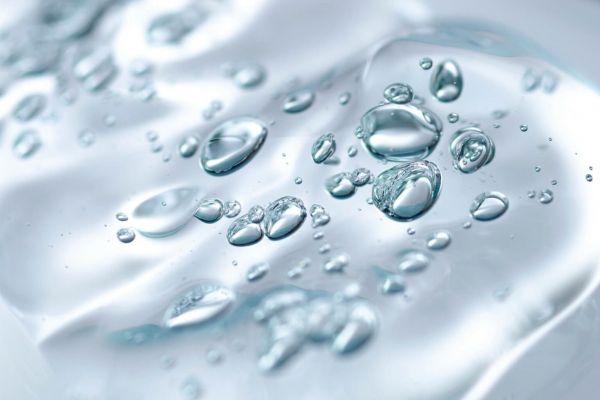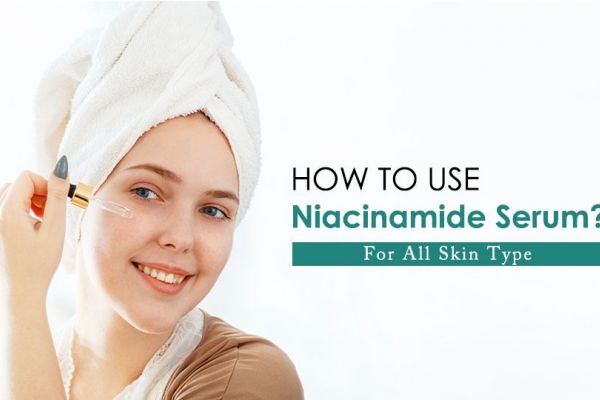Hyaluronic acid and niacinamide are popular skincare ingredients for their diverse benefits and it is also widely used in the beauty industry. To get the perfect and fine result you need to check properly. Before using the product, you need to know all these things, understanding their properties, benefits, and differences can help in selecting the right products to address specific skincare needs effectively.
Hyaluronic Acid is a natural hydrator that is celebrated for its exceptional moisture-retention properties, fostering a plump and supple complexion. Meanwhile, Niacinamide, or Vitamin B3, boasts versatile qualities, from calming inflammation to brightening uneven skin tone.
Hyaluronic Acid
Hyaluronic Acid is simply known as HA which is a naturally occurring substance in the body that plays a crucial role in maintaining moisture levels in the top layer of the skin. It contains a glycosaminoglycan molecular, a type of molecule that can hold a large amount of water relative to its size, which makes it an excellent hydrating agent.

Benefits:
- Hydration: HA is recognised for its capability to attract and retain moisture in the skin that, helps to keep skin plump and hydrated.
- Plumping Effect: When applied topically, HA can temporarily plump up the skin, which helps in the reduction of the appearance of fine lines and wrinkles. By keeping moisture in the skin, HA can temporarily reduce the appearance of fine lines and wrinkles, giving the skin a smoother and more youthful look.
- Barrier Function: It also helps in maintaining hydration, HA supports the skin’s natural barrier function, and has anti-inflammatory properties, making it more beneficial for soothing irritated skin and reducing redness. It reinforces the skin’s natural barrier function which is essential for protecting against environmental stressors and maintaining overall skin health.
Suitability:
Did you know that hyaluronic acid is suitable for all skin types, including dry, oily, sensitive, and acne-prone skin? Because it is especially beneficial for dehydrated skin lacking in moisture.

Ingredient Secret
Dry Skin:
- Intense Hydration: For the dry skin types, HA provides intense hydration, that helps to replenish moisture levels and alleviate dryness.
- Improves Skin Texture: By boosting hydration, HA can improve the texture of dry skin, making it appear smoother.
- Barrier Support: HA supports the skin’s natural barrier function, that often compromised in dry skin, by reducing sensitivity and preventing moisture loss.
2. Oily and Acne-Prone Skin:
- Lightweight Hydration: HA provides hydration without adding excess oil to the skin, which makes it suitable for oily and acne-prone skin types.
- Non-Comedogenic: HA is non-comedogenic, which means it won’t clog pores or exacerbate acne breakouts.
- Balances Moisture Levels: It helps to balance moisture levels in oily skin, which prevents the skin from overproducing oil as a response to dehydration.
3. Sensitive Skin:
- Gentle Hydration: HA is gentle and well-tolerated by sensitive skin types, that provides hydration without causing irritation or sensitivity.
- Soothing: It has soothing properties that can help calm and reduce redness in sensitive skin of the body and face.
- Supports Barrier Function: By maintaining hydration, HA reinforces the skin’s barrier function, which is essential for protecting sensitive skin from external irritants.
4. Combination Skin:
- Balances Hydration: Also, HA can balance hydration levels in different areas of combination skin, which provides moisture to drier areas without making oily areas greasy.
- Improves Overall Texture: HA contributes to a more balanced and uniform texture in combination skin.
5. Mature Skin:
- Anti-Aging Effects: HA helps to plump up the skin and reduce the appearance of fine lines and wrinkles, which is beneficial for mature skin.
- Firming and Elasticity: It improves skin elasticity and firmness, which tends to decrease with age, and gives the skin a more youthful appearance.
- Restores Moisture: HA helps to restore moisture levels that decline with aging and, improves overall skin health and resilience.

Source: Everyday Health
Application
Now, let’s talk about its application HA is generally found in serums, moisturizers, and other skincare products which is especially designed to boost hydration. It is generally well-tolerated and can be used both morning and night.
- Formulations: HA is commonly found in various skincare products, like serums, moisturizers, masks, and even makeup products like foundations, primers and many more.
- Layering: It can also be used in combination with other skincare ingredients, such as niacinamide, antioxidants, and peptides, to enhance hydration and maximize benefits.
- Day and Night Use: HA is versatile and suitable for both morning and nighttime skincare routines. However, it can be applied after cleansing and toning, before moisturizer and sunscreen during the day, or as a part of a nighttime regimen.
- Pairing with Other Ingredients: HA works synergistically with moisturizing agents like glycerin and ceramides, that boost their effectiveness in maintaining skin hydration.
Choosing Hyaluronic Acid Products
If you are deciding to buy HA products then these things need to be considered:
- Concentration: Higher concentrations of HA (typically 1% or more) in serums or treatments may provide more intense hydration, but lower concentrations (0.1%-0.5%) in moisturizers can also be effective for daily use.
- Formula: Look for products that combine HA with complementary ingredients like antioxidants or peptides for enhanced benefits but you need to avoid products that contain fregance.
- Packaging: Airless pumps or opaque packaging can help preserve the stability and efficacy of HA by protecting it from air and light exposure. So, Alway check the packaging level of the products.
Niacinamide
Niacinamide, another name given for Niacinamides is vitamin B3 or nicotinamide, which is a water-soluble vitamin that offers a wide range of benefits for the skin. It is better known for its soothing and anti-inflammatory properties.
Benefits:
- Barrier Function: Niacinamide helps to strengthen the skin’s barrier, and Regular use of niacinamide can help refine the skin’s texture, making it smoother and more even-toned.
- Anti-inflammatory and Anti-Aging Properties: It reduces inflammation, which is beneficial for conditions like acne, rosacea, and eczema. Also, It can improve the appearance of fine lines, wrinkles, and dullness, promoting a more youthful complexion.
- Oil Regulation and Minimizes Pores: Niacinamide helps in oil regulation, it regulates oil production, which is suitable for oily and acne-prone skin types. Besides this, Niacinamide helps tighten pores and regulate sebum production, reducing their appearance over time.
- Pigmentation and Hyperpigmentation: It can help fade dark spots and even out skin tone over time. Also, It is more effective in fading dark spots, hyperpigmentation, and post-inflammatory hyperpigmentation (PIH) left by acne.
Suitability:
Did you know that, Niacinamide is suitable for all skin types, including dry, oily, sensitive, and acne-prone skin it is especially beneficial for those with acne-prone skin due to its anti-inflammatory and sebum-regulating properties.

Vince Care
Dry Skin:
- Barrier Support: Niacinamide strengthens the skin barrier, which is often compromised in dry skin. Which helps to retain moisture and prevent dehydration.
- Hydration: By improving the barrier function, niacinamide enhances the skin’s ability to retain moisture, which leads to improved hydration levels.
- Texture Improvement: Also, it smooths rough patches and enhances all overall skin texture, making it feel softer and more supple.
2. Oily and Acne-Prone Skin:
- Sebum Regulation: Niacinamide regulates oil production in the skin, reducing excessive sebum that can contribute to acne breakouts.
- Anti-inflammatory: It has anti-inflammatory properties that help reduce redness and irritation associated with acne, which makes it more beneficial for calming active breakouts.
- Pore Refining: By controlling oil production and reducing inflammation, niacinamide helps minimize the appearance of enlarged pores.
3. Sensitive Skin:
- Soothing: Niacinamide is better-known for its gentle nature and ability to soothe sensitive skin. That helps in the reduction of redness and calms reactive skin.
- Barrier Strengthening: It reinforces the skin barrier, which is crucial for protecting sensitive skin from external irritants and allergens.
- Tolerance Building: When you use niacinamide in the regular basis it can help in improve the tolerance of sensitive skin over time, making it less reactive.
4. Combination Skin:
- Balancing: Niacinamide balances oil production, especially in the T-zone while hydrating drier areas of the face, helping to maintain a more even complexion.
- Pore Minimization: It reduces the appearance of pores on the oily parts of the face, creating a smoother overall texture.
5. Mature Skin:
- Anti-Aging: Niacinamide addresses multiple signs of aging, such as fine lines, wrinkles, and loss of elasticity, promoting a more youthful appearance.
- Brightening: It helps to fade dark spots and hyperpigmentation that is caused by sun damage or aging, resulting in a more even skin tone.
- Firming: By improving skin elasticity and firmness, niacinamide helps to counteract sagging skin associated with aging.
Application:
Niacinamide is mostly found in serums, moisturizers, and spot treatments. It is gentle enough for daily use and can be incorporated into both morning and nighttime skincare routines.

- Versatility: Niacinamide is found in various skincare products like serums, moisturizers, toners, and spot treatments.
- Compatibility: It is well-tolerated by most skin types, including sensitive skin, due to its gentle nature and non-irritating properties.
- Layering: Niacinamide can easily be adjusted into morning and nighttime skincare routines. It can be applied after cleansing and toning, before moisturizer and sunscreen during the day, or as part of a nighttime
- Combination with Other Ingredients: Niacinamide can be paired well with other skincare ingredients like hyaluronic acid, retinoids, and antioxidants, enhancing their efficacy and providing additional benefits.
Choosing Niacinamide Products
If you are deciding to use niacinamide products then these things need to be considered:
- Concentration: Effective concentrations typically range from 2% to 5%. While higher concentrations may provide more noticeable results, but lower concentrations can still be effective for daily use.
- Formulation: Look for stable formulations that ensure the niacinamide remains potent and effective. Avoid products with potential irritants or sensitizers if you have sensitive skin.
- Combination Products: Consider products that combine niacinamide with complementary ingredients like hydration (e.g., hyaluronic acid) or antioxidants for enhancing extra skincare benefits.

Source: Shutterstock
Differences
| Hyaluronic Acid | Niacinamide | |
| Primary Function | It focuses on hydration and moisture retention | It targets multiple concerns including inflammation, pigmentation, and maintaining skin barrier function. |
| Skin Types | It is Suitable for all skin types, especially beneficial for dry skin. | It is suitable for all skin types, with specific benefits for oily and acne-prone skin. |
| Key Benefits | It Hydrates, plumps, and maintains moisture balance. | It Strengthens the skin barrier, reduces inflammation, regulates oil production, and improves skin tone. |
| Texture | Both ingredients are commonly found in lightweight serums and moisturizers. | Both ingredients are commonly found in lightweight serums and moisturizers. |
FAQs
What are the key differences between Hyaluronic Acid and Niacinamide?
The key difference is HA focuses primarily on hydration and moisture retention, while niacinamide addresses multiple concerns including barrier support, oil regulation, and pigmentation
Is Niacinamide suitable for sensitive skin?
Yes, niacinamide is generally well-tolerated by sensitive skin due to its gentle nature and soothing properties.
Can Hyaluronic Acid and Niacinamide be used together?
Yes, HA and niacinamide can complement each other in a skincare routine. While HA provides hydration, niacinamide offers additional benefits like barrier strengthening and pigmentation control.
Also, read more about 15 Best Acne Scar Treatment for Smooth Skin and Brighter Skin
